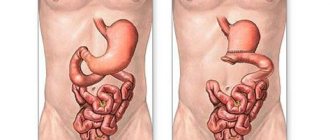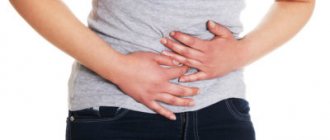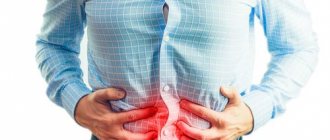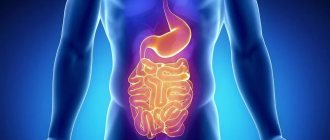Every person is familiar with the symptoms of shortness of breath; it occurs after heavy physical exertion or after suffering stressful shocks. But another reason for its appearance is gastrointestinal pathologies caused by poor diet. This is due to the fact that proteins and fats are not broken down and do not create the necessary building material for the restoration of the gastric epithelium. Pathological shortness of breath is considered to be in cases when it begins to cause discomfort and significantly impede air intake.
Shortness of breath from the stomach: causes and symptoms
This is a condition in which a person feels a lack of air and oxygen starvation. At such moments, it is difficult for the patient to breathe; he acutely feels the need for constant air intake. Often shortness of breath develops against the background of gastrointestinal pathologies, which result in impaired respiratory function due to spasms of the diaphragm. With poor nutrition, accumulation of gases or damage to the mucous membrane of an internal organ, dysfunction of the digestive process occurs. Air accumulates in the stomach and respiratory tract, the exit of which is difficult due to compression. After physical activity, dyspnea is characterized as a normal condition in which a person reflexively compensates for the lack of air with frequent and systematic breaths. A number of these processes and disruptions in the body cause shortness of breath, characterized by difficulty breathing. There are other causes of the pathological symptom:
- obesity;
- stomach ulcer;
- dysfunction of the digestive organs;
- pathologies of the gastrointestinal tract;
- duodenal diseases;
- gastritis;
- oncology.
Symptoms
Often the symptom is combined with an unpleasant belching.
Often, if the pathological condition is ignored, belching begins to develop along with shortness of breath, which is accompanied by an unpleasant odor and taste in the oral cavity. Such symptoms indicate disturbances and imbalances in the gastrointestinal tract, especially if the patient has been diagnosed with stomach diseases. The condition occurs both periodically and as a permanent phenomenon. In certain cases, shortness of breath occurs on its own, for no apparent reason. Symptoms include the following:
- it becomes difficult to breathe;
- presses in the stomach area;
- stomach ache;
- rapid breathing;
- need for fresh air;
- inability to produce a full air intake;
- feeling of panic;
- pressure on the diaphragm;
- dry wheezing when inhaling;
- It hurts to swallow and inhale air.
Difficulty in breathing is also observed in older people, as well as overweight patients. The heavy load on the body limits the ability to breathe deeply, since the process is accompanied by cramping pain and pressure on the chest. Shortness of breath from the stomach is a common phenomenon among patients with disorders and pathologies of the gastrointestinal tract, so doctors, when diagnosing, assume the possibility of pathological dysfunction occurring in the future.
The appearance of shortness of breath for no reason is a pathological condition that requires medical intervention. Ignoring the problem can transfer the disease to a chronic stage.
Feeling of a lump in the stomach
Gastritis
33361 August 21
IMPORTANT!
The information in this section cannot be used for self-diagnosis and self-treatment.
In case of pain or other exacerbation of the disease, diagnostic tests should be prescribed only by the attending physician. To make a diagnosis and properly prescribe treatment, you should contact your doctor. Feeling of a lump in the stomach: causes of occurrence, what diseases it occurs with, diagnosis and treatment methods.
The feeling of a coma in the stomach is described when one experiences a feeling of heaviness, discomfort and fullness in the stomach, even when it is only slightly filled. Sometimes patients find it difficult to determine the exact location of the coma and point to the lower third of the sternum or solar plexus. In some cases, a feeling of a lump and cramps in the stomach may occur on an empty stomach.
Types of feeling of a coma in the stomach
A feeling of heaviness or coma in the stomach can be an independent symptom, but may be accompanied by other unpleasant sensations. Sometimes it is heartburn, sour belching, bloating, constipation.
In some cases, a feeling of a lump appears when swallowing
, making it difficult for chewed food to pass through.
In addition, patients may complain that food did not enter the stomach, but stopped in the esophagus.
In such patients, vomiting of unchanged food is possible. When describing symptoms, you should pay attention to the time of onset of discomfort - before
or
after eating
.
The patient may feel heaviness in the stomach with pain or heartburn, on an empty stomach or after eating, and night pain also occurs.
Sometimes the sensation of a lump in the stomach occurs
regardless of food intake
.
In such cases, they complain of stomach spasms
, sometimes accompanied by a feeling of a lump in the throat.
What diseases cause a sensation of a lump in the stomach?
Eating more than your usual amount of food
, accompanied by a feeling of fullness and heaviness in the stomach. This condition is not a manifestation of the disease and goes away on its own after some time.
It should be noted that stomach capacity varies depending on eating habits.
People who are small or
have undergone gastric resection
can eat a small portion, otherwise they will not only experience a feeling of heaviness or fullness in the stomach, but also vomiting.
A sensation of coma may occur when consuming foods that cause excess gas.
, as well as
food that is difficult to digest
(salads with mayonnaise, fatty, fried and smoked dishes) and
highly carbonated drinks
.
When eating dry and hastily,
an unpleasant sensation in the epigastric region is caused by poor processing of the food bolus with saliva and insufficient secretion of gastric juice.
However, a feeling of coma or discomfort in the stomach, or more precisely, in the epigastric region, may appear after eating even a small amount of food
.
This condition can be caused by diseases of the gastrointestinal tract or other reasons.
First of all, they assume indigestion, or functional dyspepsia. Its symptoms most often include pain and discomfort immediately after eating, a feeling of heaviness and fullness in the stomach, heartburn, belching, nausea, sometimes vomiting, reflux of stomach contents into the esophagus, bloating and bowel dysfunction.
Dyspepsia can be a symptom of both functional disorders of the gastrointestinal tract and organic diseases.
Functional causes of dyspepsia are often caused by errors in diet and medications.
Iron ions have an irritating effect on the gastric mucosa, which is most pronounced when taking medications based on ferrous iron. Nonsteroidal anti-inflammatory drugs, which are systematically taken for rheumatic and non-rheumatic diseases of the musculoskeletal system, also cause undesirable effects: heaviness and discomfort in the stomach, nausea, vomiting, and dyspeptic disorders.
Neurological disorders
(neuroses, depression), psychological trauma almost always affects the state of the gastrointestinal tract, leading to impaired motility.
Functional dyspepsia is not accompanied by erosive or ulcerative lesions of the stomach; its symptoms disappear when the general state of health is normalized.
One of the common causes of discomfort in the stomach immediately after eating is
gastritis
. It is accompanied by functional and inflammatory processes that have a negative effect on the gastric mucosa. Symptoms of gastritis include heaviness and pain in the stomach, indigestion, nausea, heartburn, sour belching and bloating when eating any food. The inflammatory process leads to atrophy of the mucous membrane and disruption of the glands that secrete gastric juice.
Insufficient gastric juice and weak peristalsis of the stomach and intestines make it difficult to digest food.
Gastritis is often accompanied by dyspepsia. In addition to a feeling of heaviness and aching pain in the epigastric region after eating, poor appetite, weakness, fatigue, and irritability are noted. When pressing on the abdomen, a dull pain appears in the projection of the stomach.
Impaired motor-evacuation functions
upper digestive tract is always accompanied by a feeling of coma or a feeling of heaviness in the stomach. Disorders of esophageal motility are usually caused by incoordination of the esophageal sphincters. Uncoordinated work of the esophageal muscles can lead to a delay in the bolus of food on the way to the stomach, the reflux of food particles into the respiratory tract, and reflux (return of stomach contents into the esophagus). Impaired gastric motility leads to slow emptying, which is accompanied by a feeling of heaviness and fullness even with a small amount of food consumed, pain in the epigastric region, heartburn, nausea and vomiting.
Motility disorders of the esophagus and stomach may be associated with gastroesophageal reflux disease, gastritis, tumors and stenoses (narrowings), metabolic disorders (hyperkalemia, hypercalcemia), postoperative complications of gastrectomy, taking certain medications (opiates, antidepressants, hormones), alcohol and nicotine .
Peristalsis worsens with a sedentary lifestyle and with age.
Stomach cancer can also cause symptoms such as a feeling of heaviness or a lump in the stomach. Moreover, depending on the location of the tumor, its manifestations vary. If the tumor is located closer to the esophagus, problems with swallowing food occur. This is accompanied by increased salivation, nausea, vomiting, and pain in the epigastric region. When the tumor is localized in the lower parts of the stomach, closer to the duodenum, a prolonged feeling of heaviness after eating and bloating is characteristic. When burping, a putrid odor may be felt.
Which doctors should you contact if you feel a lump in your stomach?
If there is a constant feeling of a lump in the stomach or a feeling of heaviness, it is necessary to contact or to make a preliminary diagnosis. The gastroenterologist may also refer the patient to an oncologist. A consultation may also be required.
Diagnosis and examination if you feel a lump in the stomach
First of all, clinical blood and stool tests are necessary for differential diagnosis.
Timely diagnosis is a chance to prevent complications
If such a manifestation complements stomach pain, then you should see a doctor.
If the patient begins to notice that due to pain in the stomach, his chest is compressed, it becomes difficult to catch his breath, or he begins to choke, then he should immediately consult a doctor to avoid negative complications. This condition can become chronic. After a complete history and examination, the doctor prescribes a number of measures that will help establish the cause and pathogenesis of shortness of breath. To do this you need:
- general urine and blood tests;
- blood chemistry;
- Ultrasound of the digestive organs;
- X-ray;
- CT and MRI.
Treatment options
It is difficult to get rid of dyspnea right away. To do this, the patient is recommended to eat something sour after eating or take acid-lowering drugs that will help digestion and the process will go smoothly. Typically, patients experience bloating, stomach pain, heaviness and gas formation, which compresses the diaphragm, causing difficulty in heartbeat and breathing. Therefore, many people confuse shortness of breath from the stomach with signs of pathologies of the cardiovascular system. Therapy for the disease is prescribed only after determining the causes of its occurrence. It includes comprehensive treatment:
Medicines will help get rid of the troubling problem.
- medicines;
- acid-lowering agents;
- diet;
- folk remedies;
- prevention procedures (sanatoriums, physiotherapy, proper nutrition).
Prevention
To avoid the appearance of this unpleasant symptom, it is initially necessary to completely cure the underlying disease that caused the dyspnea. Qualified treatment will help prevent this phenomenon and other associated complications. Patients with gastrointestinal diseases are advised not to load the stomach, and eat small portions 5-6 times a day. Avoid foods that increase acidity and stick to a prescribed diet. Periodically undergo diagnostics, which will allow you to determine the prerequisites for pathology in the early stages. It is important to control weight for people with signs of obesity; they are recommended to lose weight. It is useful to take herbal decoctions for daily preventive treatment of the gastrointestinal tract. You should be in the fresh air more often and give up bad habits.
Why does my stomach feel heavy after eating?
Heaviness in the stomach can appear not only after eating, but also on an empty stomach. Therefore, the causes of occurrence are divided into several large groups. The first group of factors, namely the severity of the stomach after eating, includes:
- poor nutrition. Quick snacks on the go or foods enriched with a lot of fat or hot spices;
- overeating, especially a few hours before bedtime. This may cause a person to feel very heavy in the morning;
- Irrational diet, when a person eats one or two times a day. Normally, you need to eat small portions, preferably six times a day;
- eating a large number of dishes at one meal;
- dishes consisting of incompatible or long-digesting foods.









